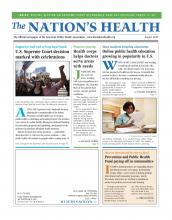The doctor said you need to shed some pounds. Don’t feel bad — you’re not the only one.
According to federal statistics, more than two-thirds of adults in the United States are overweight and more than one-third are obese. If you’re not familiar with the lingo, the term “obese” roughly means you’re toting around more body fat — relative to your height — than you should be. But no matter where you’re tipping the scales, you need to follow the doctor’s orders. Obesity-related conditions such as heart disease, stroke, certain types of cancer and Type 2 diabetes are among the leading causes of death.
The good news is that the battle of the bulge is winnable. Whether your weight-loss goal is 50 pounds or 150 pounds, losing just a small amount — 5 percent to 7 percent of your total body weight — can improve your health by reducing your blood sugar and lowering your cholesterol and blood pressure.
Like too many Americans, you might need to lose a lot of weight. If so, make sure you lose it safely. From nationally known commercial programs that require you to attend meetings, weigh-in or buy their own line of foods, to the low-carb diets such as Atkins, most of the popular weight-loss programs are safe, according to James Hill, PhD, executive director of the Anschutz Health and Wellness Center at the University of Colorado.

Losing just a small amount of weight can lead to health improvements.
Photos and art courtesy iStockphoto. Scale photo by Sean Locke
“The ones that you have to be careful about are where there’s a very low calorie intake,” Hill says. “Those should be medically supervised. The other diets — the popular diets, the commercial diets — I don’t worry about the safety of those. In the long run, the benefits of weight loss outweigh diet composition, so again, I think those are perfectly safe.”
Hill says he worries about diet programs that require users to get injections of vitamins and other substances.
“Those we just have no data about,” Hill says. “I can’t tell you that they’re unsafe, but I really like to see people using things that have been studied by researchers.”
And keep in mind that when it comes to losing weight, fad diets might promise quick results, but staying on them longer than the prescribed time can limit your nutritional intake, harm your health and cause your diet to fail in the long run.
Check it out before committing
You probably know someone who lost a ton of weight on her or his own and has managed to keep it off for many years. But some people prefer a more structured, or even social, approach to weight loss. For them, joining a weight-loss program may work. If you sign up for one, be aware that before you drop a pound, you’ll have to drop some bucks — perhaps a lot of bucks. Don’t hand over your credit card until you get answers to some important questions, such as the percentage of people who complete the program. Also, are qualified counselors available to help you make permanent lifestyle and behavioral changes, or to deal with those moments when a cheeseburger is calling out to you?
If the program requires you to purchase a particular line of foods, find out if the choices are varied enough to keep you interested. Also ask if anyone has suffered side effects from the foods, drinks or supplements they want to sell you. Keep in mind that diets that limit your food choices are hard to follow. Many people grow weary of them and end up regaining the weight they lost.
According to the National Institutes of Health, the weight-loss program you choose should be based on regular physical activity and an eating plan that is balanced, healthy and easy to follow.
Get moving and stay on target
If you are overweight or obese, keep in mind that victory doesn’t come with dieting down to a perfect size, but with keeping the weight off permanently. The biggest mistake dieters make, says Hill, is that they adopt certain behavioral changes to lose weight but then go back to living life the way they did before, and are surprised when the weight creeps back.
Most dieters gain the weight back because they aren’t able to make sustained behavioral changes, says Hill, who co-founded the National Weight Control Registry to identify the characteristics of people who succeed at long-term weight loss. Food restriction is the primary driver of loss, he says, but when it comes to keeping the weight off, activity — getting your body moving for 30 to 90 minutes a day — becomes the most important thing. And you don’t have to do the exercise all at once.
Among people who succeed at long-term weight loss, walking is the most common form of physical activity, he says.
“It matters that you do something, and it can be a lot of different types of exercise,” Hill says. “But it needs to be done consistently, day in and day out.”
Take it slow and steady
Remember: Slow and steady wins the race. According to the National Institutes of Health, losing weight too quickly, such as more than three pounds a week after the first few weeks, can put you at increased risk for developing gallstones. Also, diets that provide less than 800 calories per day can result in heart rhythm abnormalities, which can be deadly.
- Copyright The Nation’s Health, American Public Health Association









